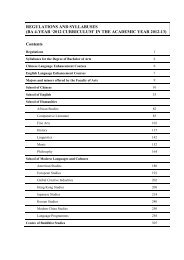Bachelor of Arts (BA) - The University of Hong Kong
Bachelor of Arts (BA) - The University of Hong Kong
Bachelor of Arts (BA) - The University of Hong Kong
Create successful ePaper yourself
Turn your PDF publications into a flip-book with our unique Google optimized e-Paper software.
208HIST2055.<strong>The</strong> Chinese rural economy, with special reference to Guangdong province, 1870sto 1930s (6 credits)(This course is also <strong>of</strong>fered to second and third year non-<strong>BA</strong> students for inter-Faculty broadeningpurposes.)This course aims at introducing to students a significant body <strong>of</strong> Western literature on the controversialsubject <strong>of</strong> the late Qing and Republican rural economy. It uses the case <strong>of</strong> Guangdong to illustrate themerits as well as limitations <strong>of</strong> different schools <strong>of</strong> thought regarding the Chinese rural economy in themodern period. Special attention is drawn to the man-land ratio, the production <strong>of</strong> the staple food crop,trade, the commercialization <strong>of</strong> agriculture, land tax, rent and rural credit. Although distinctive insignificant ways, Guangdong's rural economic development displayed a pattern that was congenial withthe trend <strong>of</strong> development throughout China.Assessment: 100% coursework.HIST2056.Gender and history (6 credits)(This course is also <strong>of</strong>fered to second and third year non-<strong>BA</strong> students for inter-Faculty broadeningpurposes.)What has it meant to be 'male' or 'female' in different times and places? How can asking such questionsaffect our understanding <strong>of</strong> history? In this course we will study the cultural construction <strong>of</strong> masculinityand feminity, both Western and Asian, through reading and discussing works by some <strong>of</strong> the majorscholars in this field.Assessment: 100% coursework.HIST2057.Social history <strong>of</strong> contemporary Japan (6 credits)This course will study changes in society in contemporary, post-World War II Japan. In particular, itwill look at the transition from an agricultural economy to an industrial economy and the social impact<strong>of</strong> that transition; at the experience <strong>of</strong> minority groups; and at the experience <strong>of</strong> women.Assessment: 100% coursework.HIST3015.<strong>The</strong> theory and practice <strong>of</strong> history (6 credits)(This course is open to third year students only.)This course aims to acquaint students with some <strong>of</strong> the theoretical and practical considerations whichunderlie the study and writing <strong>of</strong> history by considering the development <strong>of</strong> the discipline <strong>of</strong> historyfrom its beginnings in the ancient world through to the postmodernist critique. <strong>The</strong> course is especiallyrecommended to those who wish to pursue history at the postgraduate level. All students taking theDissertation elective are required to take <strong>The</strong> theory and practice <strong>of</strong> history.Assessment: 100% coursework.HIST3016.Computer methods for historical studies (6 credits)(This course is open to third year students only.)Computers and information technology are playing an increasingly important role in historical researchand teaching. <strong>The</strong> theoretical and practical implications <strong>of</strong> these developments are considered in thiscourse. Students will learn to use a range <strong>of</strong> relevant information technologies such as databases andweb-authoring tools, but they will also be expected to assess critically their uses by historians. Teachingwill be primarily through workshop sessions. This course <strong>of</strong>fers a range <strong>of</strong> skill-learning opportunitiesfor students who intend to pursue historical studies at the postgraduate level. It will also be particularlyvaluable to students who wish to teach History in the schools where information technology willbecome more common under new government initiatives.Assessment: 100% coursework.
















